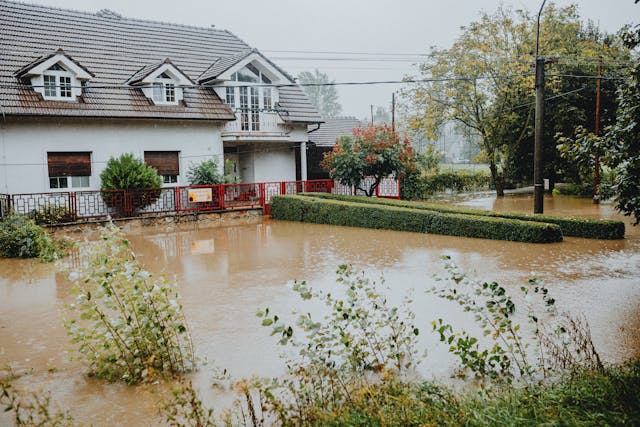Flooding is one of the most destructive events that can affect a home, and basements are particularly vulnerable due to their location below ground level. Whether it’s caused by heavy rains, melting snow, or a burst pipe, basement flooding can lead to significant water damage, mold growth, and long-term structural issues. Many homeowners may wonder, does home insurance cover basement flooding? The short answer is, it depends.
In this article, we’ll take a deep dive into how home insurance works in the event of basement flooding, what is typically covered, and how you can protect your home and belongings from water damage.
Introduction: Understanding Basement Flooding
Basement flooding is a common issue that can occur for a variety of reasons. Since basements are located below ground level, they’re at a higher risk of being affected by water seepage or backup. Even if you live in an area that isn’t typically prone to flooding, certain conditions can still lead to water entering your basement, causing severe damage to your home and belongings.
What is Basement Flooding?
Basement flooding refers to the accumulation of water in the basement, often leading to pooling or standing water. It can be caused by natural factors like heavy rain, melting snow, or rising groundwater, as well as man-made issues such as burst pipes, sewer backups, or malfunctioning sump pumps.
Common Causes of Basement Flooding
-
Heavy Rainfall: When drainage systems can’t keep up with torrential downpours, water may seep into basements through foundation cracks.
-
Snowmelt: As snow melts in the spring, the excess water may overwhelm the foundation.
-
Sewer Backup: Clogged or overwhelmed sewer systems can cause waste and water to back up into your basement.
-
Broken Pipes: Pipes can burst, especially in cold weather, causing water to leak into the basement.
-
Poor Drainage: Inadequate grading or clogged gutters can lead to water pooling around your foundation.
Does Standard Home Insurance Cover Basement Flooding?
In general, standard home insurance does not cover flooding, including basement flooding, unless it’s due to a covered peril, such as a burst pipe. While your home insurance might help with some water damage, it’s essential to understand the specifics of what’s included in your policy.
How Home Insurance Typically Handles Flooding
Standard home insurance policies typically cover water damage caused by accidental, sudden events. For example, if a pipe bursts in your home and floods the basement, your home insurance will likely cover the damage caused by the water. However, flooding due to natural events, such as rising water levels or groundwater flooding, is usually excluded.
Key Exclusions in Standard Policies
-
Flood Damage: Water that rises from rivers, streams, or heavy rain that affects your basement is not covered by a standard home insurance policy.
-
Groundwater Seepage: Water that seeps up from the ground through the foundation is excluded.
-
Sewer Backups: Unless you have specific sewer backup coverage, home insurance won’t cover the damage caused by backed-up sewage.
What Does Standard Home Insurance Cover in Case of Basement Flooding?
While flood damage from natural disasters is typically excluded, some water-related damage may still be covered under a standard home insurance policy.
Damage to the Structure
Home insurance may cover damage to the physical structure of your basement caused by water from a burst pipe or another covered event. This might include damage to the walls, flooring, insulation, and the foundation itself.
Coverage for Personal Property
If personal belongings in your basement are damaged by water from a burst pipe or an appliance malfunction, your policy may provide coverage. This can include items like:
-
Furniture
-
Electronics
-
Clothing
-
Family heirlooms or personal items stored in the basement
However, items that are vulnerable to water damage, such as paper documents or certain types of electronics, may not be fully covered.
What’s Not Covered by Standard Home Insurance?
As mentioned, standard home insurance typically excludes certain types of water damage, including:
Flood Damage Exclusions
If your basement floods due to external factors such as rain or rising water from nearby rivers or lakes, it’s unlikely that your home insurance will cover the damage. You’ll need a separate flood insurance policy to protect your home from this type of water damage.
Gradual Damage and Lack of Maintenance
Home insurance won’t cover water damage caused by gradual leaks or poor maintenance. For example, if your basement is consistently damp due to a lack of proper drainage or you’ve neglected to repair a leaking pipe, the damage will not be covered. Insurance is intended to cover sudden and accidental incidents, not issues that occur over time.
Does Homeowners Insurance Cover Flooding from Burst Pipes?
If a pipe bursts in your basement and causes flooding, your homeowners insurance will likely cover the resulting damage to your property. This includes:
-
Water damage to floors, walls, and ceilings
-
Damage to personal belongings
-
Mold remediation if the water damage leads to mold growth
However, this coverage typically only applies if the burst pipe was a sudden and accidental event. Damage from frozen pipes that were left uninsulated might be excluded, depending on your policy.
Do You Need Flood Insurance for Basement Flooding?
Flood insurance is typically not included in a standard home insurance policy and must be purchased separately through the National Flood Insurance Program (NFIP) or a private insurer. If your basement is at risk for flooding due to heavy rains, snowmelt, or rising groundwater, you may want to consider adding flood coverage.
The Role of Flood Insurance
Flood insurance provides coverage for damage caused by rising water, including:
-
Flood damage to the basement and foundation
-
Damage to personal belongings stored in the basement
-
Repair costs for structural damage
If you live in a flood-prone area, having flood insurance is crucial. Even if flooding is rare in your area, weather patterns are unpredictable, and flooding can happen unexpectedly.
When Flood Insurance is Required
If your home is located in a high-risk flood zone, your lender may require you to carry flood insurance. Even if flood insurance is not mandatory, it’s worth considering if your property is in a moderate-to-low-risk flood zone or if your basement is particularly susceptible to water damage.
How to File a Claim for Basement Flooding
If your basement floods and you’re covered by your home insurance policy, here are the steps you should follow to file a claim:
-
Document the Damage: Take photos or videos of the damage, including any standing water, structural damage, and personal property.
-
Contact Your Insurance Company: Call your insurer to report the damage and start the claims process. They’ll guide you through the necessary steps.
-
Make Temporary Repairs: If possible, make temporary repairs to prevent further damage (e.g., turning off the water supply, using a pump to remove water).
-
Submit Your Claim: Provide the documentation and any required forms to your insurer. They’ll assess the damage and determine the payout.
Important Documents for Filing a Claim
-
Proof of ownership (e.g., deed or mortgage documents)
-
Photographs or videos of the damage
-
Receipts or proof of items damaged in the flood
-
Repair estimates or invoices
How to Prevent Basement Flooding
The best way to deal with basement flooding is to prevent it from happening in the first place. Here are some tips to help you reduce the risk:
-
Install a sump pump: A sump pump can help remove water from your basement before it can cause damage.
-
Maintain gutters and downspouts: Clean gutters regularly to ensure water is properly diverted away from the foundation.
-
Seal cracks in your foundation: Seal any gaps or cracks in your foundation to prevent water from seeping in.
-
Consider a French drain: French drains can help redirect water away from your home’s foundation.
Can You Add Flood Coverage to Your Home Insurance Policy?
In some cases, it’s possible to add flood coverage to your existing home insurance policy, but it depends on the insurance provider. Many insurers offer flood endorsements that provide additional protection for your basement and property in the event of a flood.
Frequently Asked Questions (FAQs)
1. Does home insurance cover basement flooding?
Standard home insurance does not cover flooding caused by natural events like heavy rain or rising water. However, it may cover water damage from burst pipes or accidental leaks.
2. Can I get coverage for flooding from a burst pipe?
Yes, home insurance typically covers water damage caused by burst pipes, as long as it was an accidental and sudden event.
3. What is flood insurance, and do I need it?
Flood insurance covers water damage from rising water or natural floods. If you live in a flood-prone area or your basement is at risk, flood insurance is recommended.
4. How do I prevent basement flooding?
Regular maintenance, such as installing a sump pump, sealing foundation cracks, and cleaning gutters, can help prevent basement flooding.
5. How do I file a claim for basement flooding?
Document the damage, contact your insurance company, and submit the necessary forms to start the claims process. Make temporary repairs to prevent further damage.
Please don’t forget to leave a review.


